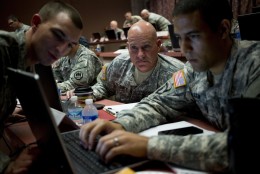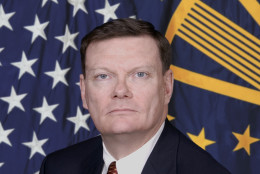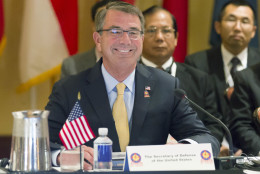Army
-
The Army is going through a drawdown, which means lots of officers are finding themselves without jobs. Some of them are talented soldiers with advanced degrees — the very type of people Defense Secretary Ash Carter wants for the future military.
November 08, 2016 -
Rumors of the death of Army Knowledge Online — the web portal soldiers and Army civilians have used for everything from training to email since the 1990s — were evidently premature.
November 07, 2016 -
The Army is currently experimenting with a concept it calls cyber support to corps and below (CSCB) — the notion that individual tactical units need to deploy with their own offensive and defensive cyber and electronic warfare capabilities and be prepared for an enemy that can and will use electronic attacks on the battlefield.
November 07, 2016 -
The Air Force is pushing out a prototype for IT acquisition that connects vendors with end users. It's part of the overarching Joint Information Environment (JIE), a unification effort and security boost for the department’s roughly 15,000 IT networks.
November 04, 2016 -
Last month, the Army, along with the rest of the military services, announced all of the active duty cyber teams they’re building for U.S. Cyber Command have reached their initial operating capability and are ready for offensive and defensive missions. Next in line: teams made up entirely of National Guard and Army Reserve personnel.
November 04, 2016 -
The Lohfeld Consulting group ranked upcoming civilian and DoD contracts that meet three criteria: a likely 2017 request for proposal, likelihood of funding and awards next fiscal year, a significant pool of contenders.
November 03, 2016 -
The Defense Department is taking growing pains in stride as it continues to work on its multi-year implementation plan of the cybersecurity system, the Joint Regional Security Stacks (JRSS).
November 02, 2016 -
As some of the best officers leave the Army, the service's personnel evaluation system is stuck in the 1950s and it's still years before anything can change. Federal News Radio's special report, The Army is Shortchanging its Future Force, shows the Army is starting to take steps to address the problem to meet its Force of the Future goals.
November 01, 2016 -
Officers with advanced civilian degrees are getting pushed out of the Army. But they are the very people Defense Secretary Ash Carter wants in the military. The Army's aging personnel evaluation system may be to blame.
October 31, 2016 -
Here's a quick overview of the Federal News Radio's special report The Army is Shortchanging its Future Force.
October 31, 2016 -
Welcome to the #FedFeed, a daily collection of federal ephemera gathered from social media and presented for your enjoyment.
October 26, 2016 -
The Pentagon says its new Silicon Valley-based technology outreach office is seeing some early successes in rapid acquisition. It handled its first dozen procurements in an average time of 60 days. But most of the money it spent went to established companies, not garage-style startups.
October 25, 2016 -
For the better part of 15 years, the Army has canceled and otherwise dis-invested in new technologies and capabilities. That means its soldiers work with old equipment and capabilities increasingly matched by potential adversaries.
October 19, 2016 -
Nora Bensahel, distinguished scholar in residence at American University, and retired Lt. Gen. David Barno, a distinguished practitioner there, are co-authors of The Future of the Army, published by the Atlantic Council. They walked Federal Drive with Tom Temin through some of the budget challenges the Army currently faces.
October 11, 2016 -
Defense Secretary Ash Carter is making an appearance on late night television. Find out what other cabinet members have gone through the gauntlet.
October 10, 2016















